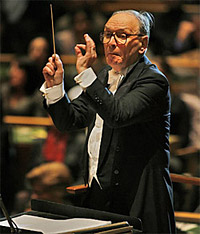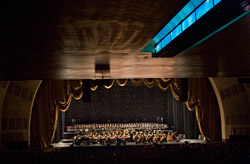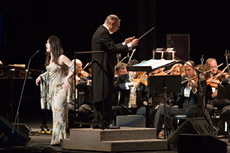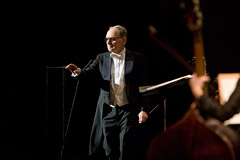February 6, 2007
Morricone Makes U.S. Debut in NYC
Maestro scores standing ovations at United Nations, Radio City by Jon Burlingame

Morricone conducting in the U.N. General Assembly Hall
(photo by Carolyn Cole / Los Angeles Times)
Morricone has, in recent years, made numerous concert appearances, performing live versions of his most popular film compositions – although never in America until now. Friday, February 2, in a private concert at the United Nations, and Saturday, February 3, at Radio City Music Hall, he made his U.S. concert debut, conducting the 100-piece Rome Sinfonietta Orchestra and a 100-voice choir (including the Canticum Novum Singers, the New York Virtuoso Singers and the University of Buffalo choir).
The timing couldn't have been better: Morricone will receive an honorary Academy Award on Feb. 25 "for his magnificent and multifaceted contributions to the art of film music." (It's hard to believe that he has only been nominated five times for the Oscar – for Days of Heaven, The Mission, The Untouchables, Bugsy and Malena – and never won.)
Friday's event was held in the General Assembly Hall at the United Nations complex. An estimated 1,600 delegates, diplomats and UN staff members attended the event, which was not open to the public, although members of the press were allowed. Preceding the music were 45 minutes of remarks by UN officials and a handful of celebrities.
The UN's new Secretary-General, Ban Ki-moon, said that he had just returned from an 11-day, nine-country trip just hours earlier but, he said, "this was one concert I could not miss." And, because Morricone's music was "full of drama," he quipped that the maestro's scores could serve as "the soundtrack for my first few weeks in office."
Actor Eli Wallach (The Good, the Bad and the Ugly) was the first of the celebrities to speak, addressing "my dear and esteemed Ennio" before discussing one of several UN "millenium development goals" eradicating poverty around the world. West African singer Angelique Kidjo talked about "creating a better world for children"; guitarist Pat Metheny discussed the "greed, ignorance and neglect" that had brought about global climate change; and Lou Reed interrupted his own talk about the importance of readily available drinking water to issue a plea for the U.S. to "get out of Iraq!"
Italian UN representative Marcello Spatafora introduced Morricone as a "master of the universal language of music," citing his innovative spirit. He explained that the program's first piece, Voci dal Silenzio ("Voices From the Silence"), was written in response to the 9/11 terrorist attacks but was intended to give voice "to all those innocent victims of violence, especially in forgotten or unknown tragedies."
A standing ovation greeted Morricone, who bowed but did not speak. Voci dal Silenzio, a 28-minute cantata for orchestra, choir, voice and prerecorded sounds, harks back to Morricone's long-held penchant for the musical avant-garde: eerie string and woodwind figures suggesting the cries of the victims; recorded voices of children, native chants and drums; complex, dissonant sounds of battle; moods that range from dramatic to melancholy; and, interestingly, a theme from The Mission near the end of the piece, perhaps suggesting the role of music in overcoming the world's evils.
Morricone also conducted a 13-minute medley of scores that accompanied two of his most powerful political films: Casualties of War, the Brian DePalma film about Vietnam War atrocities, and Burn!, Gillo Pontecorvo's film about European colonialism in a 19th-century Caribbean nation. The latter, the choral "Abolicao," was especially exciting with its five percussionists playing Latin rhythms.
The remainder of the concert was a virtual dress rehearsal for the next evening's performance. Morricone conducted a medley of themes including The Sicilian Clan and Maddalena, then a suite from The Mission. As an encore, he conducted his medley of music from Sergio Leone westerns.

Morricone and the Rome Sinfonietta Orchestra at Radio City Music Hall (photo by Stephen Shadrach)
The maestro opened with the main theme from The Untouchables, the staccato rhythms and sharp orchestral stabs that underscored Brian DePalma's 1987 film (and harked back to the composer's early '70s Italian gangster-drama scores). The sound – a very "live" feel created by the close miking of many instruments, including clearly heard page turns by the musicians – was unsettling and worrisome at first but was straightened out as the evening wore on.
The Untouchables transitioned seamlessly to music from another 1980s crime drama, Sergio Leone's Once Upon a Time in America, including the melancholy "Poverty" theme; and then to a fascinating distillation of music – classical and jazzy figures alike – from Morricone's Golden Globe-winning score for The Legend of 1900.
Morricone's hugely popular score for Cinema Paradiso was next, including both the composer's nostalgic main theme and his son Andrea's equally memorable love theme. Throughout the evening, Morricone's conducting style was never showy, never flamboyant; he conducted the orchestra with precision and quiet authority.
(The New York Times reviewer complained about a lack of film clips, and suggested longer, narrative-style suites from each score. In fact, this concert was a model of how to arrange an evening of excerpts from classic scores; suites and medleys ranged from nine to 18 minutes and were an ideal way to showcase a variety of themes, often grouped by general subject matter or filmmaker. Film clips would have been a mistake in this concert because, as has been so often demonstrated elsewhere, they distract the viewer from the music itself – and as Morricone's American-concert debut, this event was about the music, not the films.)

Susanna Rigacci performs wordless vocals during a medley of themes from Sergio Leone Westerns at Radio City.
(photo by Stephen Shadrach)
Rigacci's voice soared through the lonely theme of Once Upon a Time in the West and the glorious main title of Duck, You Sucker. The combination of soloist, orchestra and choir on "The Ecstasy of Gold" from The Good, the Bad and the Ugly brought the crowd to its feet for one of six standing ovations given the maestro throughout the nearly two-hour concert.
In a segment titled "Social Cinema," Morricone conducted music from Casualties of War and Burn! – the former, conveying a profound sense of loss in its choral lament and the latter, absolute joy in "Abolicao," the anthem for the Caribbean natives in Gillo Pontecorvo's 1970 classic about European colonialism.
An offbeat, 18-minute medley began with the composer's lighthearted theme from the obscure Italian film H2S, including a bright solo for piccolo trumpet, then continued with the shifting harmonies of The Sicilian Clan, two memorable themes (one gorgeous, one dramatic) from Metti una Sera a Cena and the exciting, decidedly pop-oriented theme from Maddalena.
(From a filmography that contains more than 350 film scores, Morricone managed to choose 15 that fairly represented his output, especially those best-known and -loved by fans. Still, the absence of "Chi Mai," the more popular theme from Maddalena that was a top-10 hit in England, seemed odd. He might also have considered music from other films that were art-house hits in the U.S., notably Investigation of a Citizen Above Suspicion and The Battle of Algiers, both of which he has done in live concerts in Europe.)
The intended closer was, predictably, a nine-minute suite from The Mission, the score that music historians agree should have won Morricone the 1986 Oscar (and an unfair denial that is, Academy officials privately admit, partly responsible for the maestro's current honorary Oscar). "Gabriel's Oboe" plus the "Mission" theme and "On Earth as It Is in Heaven" segued perfectly together – the final movement merging the Latin lyrics of the Catholic mass and the native chants of 18th-century South America – and made a triumphant finale for the evening, bringing the crowd to its feet again.

(photo by Stephen Shadrach)
It is, perhaps, impossible to do justice in words to Morricone's musical output and legacy. The lyricism, the sometimes bizarre orchestrations, the brilliant fusion of the popular and the avant-garde – and the sheer volume of his work – are difficult to summarize. But there can be no doubt that Morricone, after a lifetime of music for various media, can finally feel welcome in America.
©2007 Jon Burlingame